On February 25, the Xavier Ateneo community commemorated the 39th anniversary of the 1986 EDSA People Power Revolution, with a series of events and activities, that focused on the role of education in an engaged citizenship and the upholding of democracy in the country.
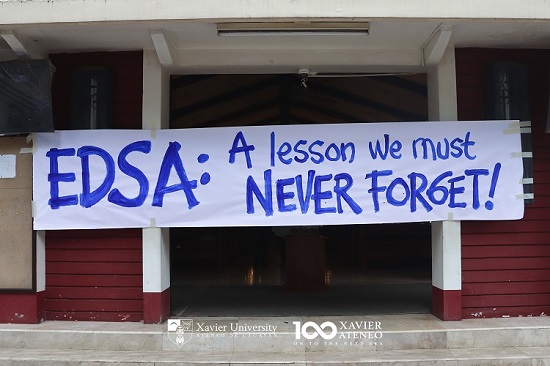
The commemoration opened with a forum led by Fr Antonio Moreno SJ, PhD, who reflected on the struggles during the Martial Law period and encouraged the community to “never lose hope in Filipinos” and “to never surrender to apathy.” During lunch break, a democracy hour unfolded at the Magis Atrium, where students expressed their solidarity through art and music.
While the afternoon continued with a discussion on youth involvement in defending democracy, led by Atty Ernesto Neri, Director for XU Center for Legal Assistance (XUCLA). He highlighted the different legal tactics used during Martial Law and the importance of civic engagement in society. A panel discussion featuring party leaders from the student-led political parties of the University then followed.
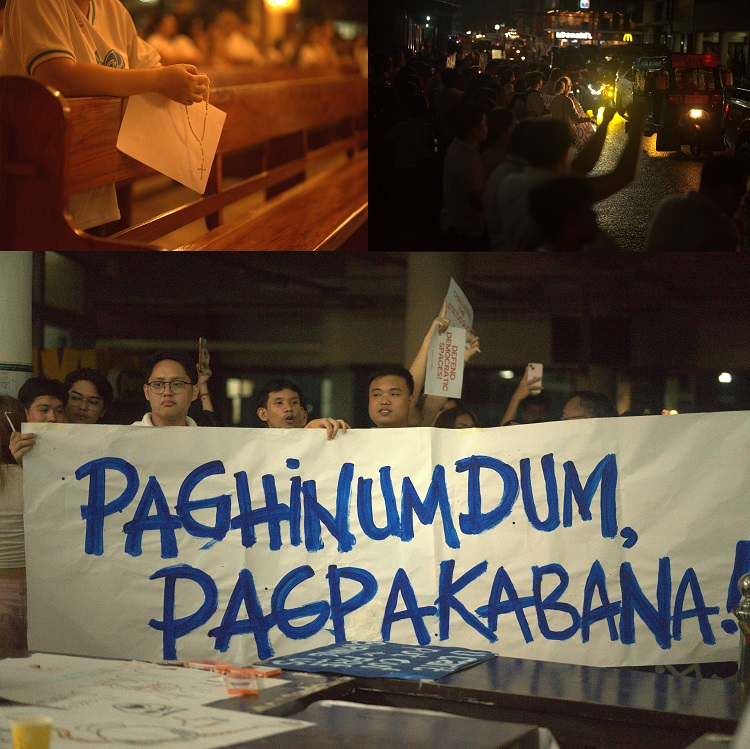 Photos by Ralf Koen Geollegue, Sophia Uy, Mic Jesster Gochuico, Precious Progella, The Crusader Publication
Photos by Ralf Koen Geollegue, Sophia Uy, Mic Jesster Gochuico, Precious Progella, The Crusader Publication
Afterwards, the day continued with a mass for peace and democracy, a community rosary, and a candle-lighting ceremony. Students, faculty, and staff then stood in solidarity along the sidewalks of the University to culminate the commemoration through the Busina Para sa Demokrasya rally, where participants urged passing vehicles to honk in support of democracy. Student leaders and faculty also delivered messages during the rally, reinforcing the call to continue upholding the spirit of EDSA. A prayer led by Fr Frank Savadera SJ and a momentous singing of Handog ng Pilipino sa Mundo, one of the movement’s anthems, was then conducted to conclude the day.
By LJ Dapanas
The Crusader Publication
Paghinumdum, Pagpakabana!: Reflecting on the Gains of EDSA People Power and Renewing Our Commitment to Democracy
Forum lead discussant Fr Antonio “Tony” Moreno SJ shared his insights on engaged citizenship and his experiences during the events of 22 to 25 February 1986. Gender and Development Officer Ms Dennise Edwina S Gonzales MA, Sociology professor Ms Ma Rhea Gretchen A Abuso MA, and SLP Formator Ms Victoria Melissa C Pulido also participated in the event as reactors.
Fr Tony recounted his personal experience rallying alongside fellow Jesuits: “It’s been a long journey…we were involved in some activities to promote men and women for others…we were against the dictatorship, but unsure what we stood for beyond that – the big shift from protest to participation.”
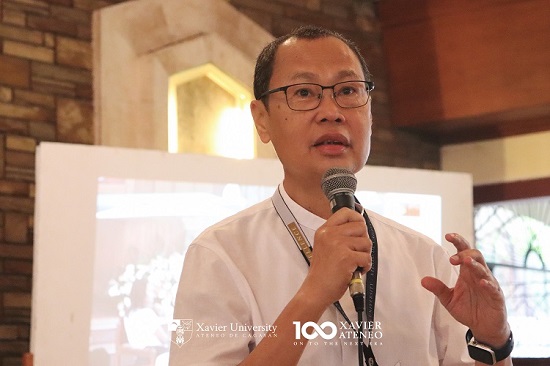
He further highlighted key factors undermining democracy, emphasizing the fragility of liberal democratic states and noting that democracy’s survival is not guaranteed. He warned specifically against the politicization of the military, referencing the seven coup attempts since the EDSA People Power Revolution, and the persistent weaknesses of political institutions that have hampered the development of a solid and well-functioning democratic system. Addressing the need for change, Fr Tony argued that engaged citizenship requires proactive involvement in tackling societal issues before they escalate into crises, extending beyond a simple awareness of one's rights. He urged citizens to anticipate challenges and act preemptively. He also stressed the importance of continuous personal and political growth to promote the common good, rejecting apathy and advocating for a society that benefits everyone. He called for engagement at all levels—personal, communal, institutional, and global—emphasizing collaboration and thoughtful reflection as crucial elements in building a more just and democratic society.
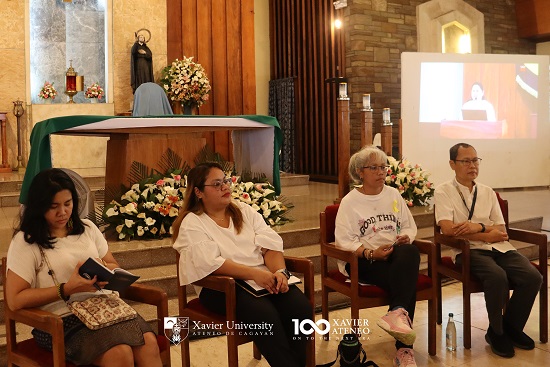
In her speech as the first reactor, Ms Gonzales mentioned that the EDSA People Power was not only a triumph of democracy but also a testament to the indispensable role of women—mothers, sisters, daughters, and grandmothers—who fueled the movement through acts of courage, care, and resistance. Women provided food and comfort, formed human shields, led prayer vigils, and spread truthful information, ensuring the movement’s success. Figures like June Keithley, Sr Delia Regidor, Yolanda Lacuesta, and Corazon Aquino demonstrated the power of women’s leadership in times of crisis.
Meanwhile, as the second reactor, Ms. Abuso’s message focused on how Filipinos develop a shared understanding of their past, particularly concerning Martial Law and the EDSA Revolution. She explored why leaders linked to human rights abuses can still be elected, possibly due to weak systems for preserving historical memory beyond commemorative events. She emphasized two key ways to build collective memory: memory laws and commemorations. Countries like Germany use memory laws to mandate remembrance of specific events, while annual commemorations strengthen unity and shared identity. Moreover, she pointed out that young Filipinos trust the education system for historical truth. Despite challenges in teaching EDSA’s lessons, schools and universities can foster informed citizens dedicated to the common good, with social roles also influencing memory formation.
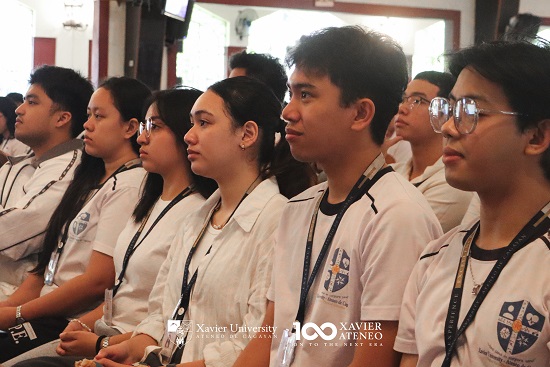
The third reactor, Ms Pulido, shared a personal connection to the Martial Law era through the story of her colleague, whose father disappeared, highlighting the real human cost behind documented cases of torture and incarceration. She made a call to action for youth to harness their time, energy, and creativity for meaningful political engagement, as demonstrated by her own experience in local activism. Educators and formators were urged to be “truth bearers,” fostering critical thinking and dialogue to combat misinformation and political polarization. Ultimately, the piece aspired for a future where EDSA was remembered not through partisan divisions but as a unified fight for democracy and justice.
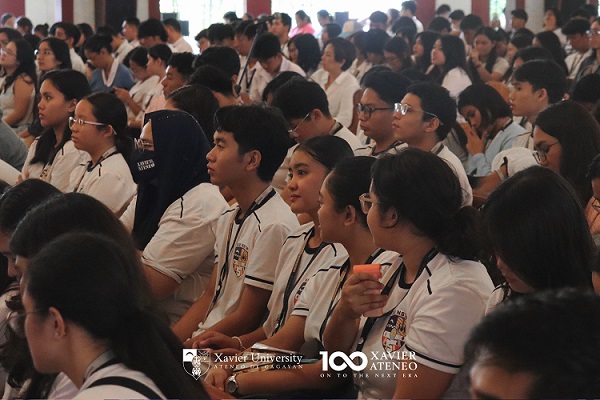
By Kaye Angelique Egay
Communications and Promotions Office